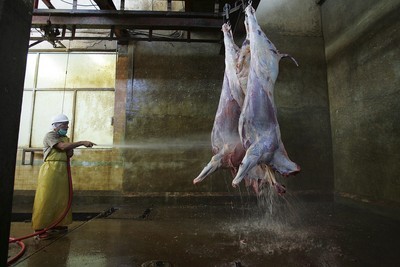Horses being sent to Mexico for slaughter, lawmakers told
WASHINGTON -- While the killing of horses for food is being banned in the United States, an increasing number of the animals are being shipped to Mexico and Canada for slaughter, members of Congress and animal rights activists charged on Thursday.
The number of horses being moved across the border has jumped more than 200 percent in the past year since U.S. slaughterhouses in Illinois and Texas were closed under state pressure, the activists said.
Citing U.S. Department of Agriculture statistics, officials from the Humane Society of the United States said 28,630 horses were sent to Mexico and, 2,431 to Canada.
Overall, 47,114 horses were sent abroad for slaughter, according to the statistics.
The USDA data do not specify whether the horses were killed for food, hides or glue. But activists said they have little doubt the animals were destined for the dinner table in countries where horse consumption is accepted.
"This ugly and horrific practice needs to be put to an end," said Sen. Mary Landrieu, D-La.
Landrieu is the sponsor of a senate amendment to ban the transport of horses to slaughterhouses outside the country that sell meat for people to eat.
The amendment would also ban interstate transport of horses to slaughter, as a possible safeguard against new U.S. slaughterhouses coming into operation.
At a news conference, the Humane Society of the United States and a handful of lawmakers displayed posters of horses penned and some of them bleeding. The photos were taken at Mexican slaughterhouses, or in transport across the border, officials said.
The Humane Society also released a video Thursday on its Web site www.hsus.org. The video purports to show some of the practices in Mexico, including video of a horse being stabbed to death.
Rep. Jan Schakowsky, D-Ill., who sponsored the bill in the House, urged members of Congress to help finish the work started last year, when the last U.S. horse slaughterhouses shut their doors.
"Some may think the job is done," she said. "Although (the closure of slaughterhouses) is welcome news, federal legislation is essential to stop the rapidly increasing export of horses for slaughter, and to prevent the plants from relocating to other states."
Former veterinarian, Sen. John Ensign, R-Nev., signed on to co-sponsor the bill and issued a statement for the amendment.
"Ending the inhumane slaughter of horses is long overdue," he said. "In too many cases horses that are perfectly healthy are sent off for slaughter, to be sold overseas for human consumption."
Rep. Ed Whitfield, R-Ky., chastised the American Cattleman's Beef Association and the American Quarter Horse Association, which have opposed the amendment.
The associations have expressed fears that restrictions on slaughter could infringe on the rights of horse owners and lead to controls on the slaughter of livestock.
"You establish a precedent that might cause people to ask, 'what is the difference between a horse and a cow? Or a cow and a pig? Or pig and a fish?" said Karen Batra, director of public affairs with the Cattleman's association.
"It is the right of our members to do what they want with their property, but I want to be clear we are not advocating slaughter. We love horses," said Barbara Linke, a spokeswoman for the American Quarter Horse Association.
Linke blamed the Humane Society for the increasing number of horses shipped overseas for slaughter.
"The reason we are talking about this now is that the society has worked to ban (slaughter) in the U.S., where we had facilities here that were federally inspected and more humane," Linke said.
Contact Stephens Washington Bureau writer Jason C. Green at jgreen@stephensmedia.com or (202) 783-1760




























